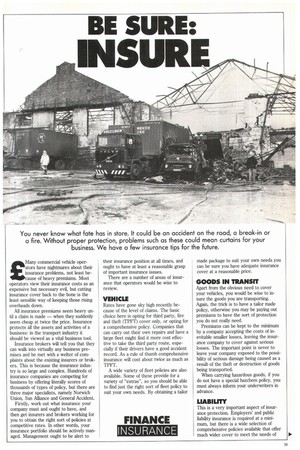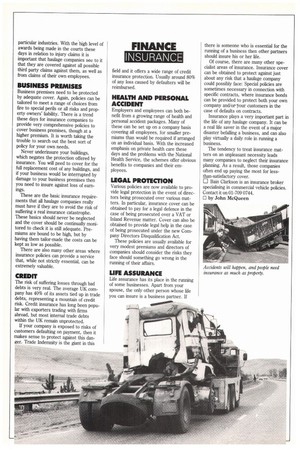BE SURE:
Page 41

Page 42

If you've noticed an error in this article please click here to report it so we can fix it.
INSURE
eMany commercial vehicle operators have nightmares about their insurance problems, not least because of heavy premiums. Most operators view their insurance costs as an expensive but necessary evil, but cutting insurance cover back to the bone is the least sensible way of keeping those rising overheads down.
All insurance premiums seem heavy until a claim is made — when they suddenly seem cheap at twice the price. Insurance protects all the assets and activities of a business: in the transport industry it should be viewed as a vital business tool.
Insurance brokers will tell you that they can walk into virtually any business premises and be met with a welter of complaints about the existing insurers or brokers. This is because the insurance industry is so large and complex. Hundreds of insurance companies are competing for business by offering literally scores of thousands of types of policy, but there are three major specialists, namely Norwich Union, Sun Alliance and General Accident.
Firstly, work out what insurance your company must and ought to have, and then get insurers and brokers working for you to obtain the right sort of policies at competitive rates. In other words, your insurance portfolio should be actively managed. Management ought to be alert to their insurance position at all times, and ought to have at least a reasonable grasp of important insurance issues.
There are a number of areas of insurance that operators would be wise to review.
VEHICLE
Rates have gone sky high recently because of the level of claims. The basic choice here is opting for third party, fire and theft (TPFT) cover only, or opting for a comprehensive policy. Companies that can carry out their own repairs and have a large fleet might find it more cost effective to take the third party route, especially if their drivers have a good accident record. As a rule of thumb comprehensive insurance will cost about twice as much as TPFT.
A wide variety of fleet policies are also available. Some of these provide for a variety of "extras", so you should be able to find just the right sort of fleet policy to suit your own needs. By obtaining a tailor made package to suit your own needs you can be sure you have adequate insurance cover at a reasonable price.
GOODS IN TRANSIT
Apart from the obvious need to cover your vehicles, you would be wise to insure the goods you are transporting. Again, the trick is to have a tailor made policy, otherwise you may be paying out premiums to have the sort of protection you do not really need.
Premiums can be kept to the minimum by a company accepting the costs of inevitable smaller losses, leaving the insurance company to cover against serious losses. The important point is never to leave your company exposed to the possibility of serious damage being caused as a result of the theft or destruction of goods being transported.
When carrying hazardous goods, if you do not have a special hazchem policy, you must always inform your underwriters in advance.
LIABILITY
This is a very important aspect of insurance protection. Employers' and public liability insurance is required at a minimum, but there is a wide selection of comprehensive policies available that offer much wider cover to meet the needs of particular industries. With the high level of awards being made in the courts these days in relation to injury claims it is important that haulage companies see to it that they are covered against all possible third party claims against them, as well as from claims of their own employees.
BUSINESS PREMISES
Business premises need to be protected by adequate cover. Again, policies can be tailored to meet a range of choices from fire to special perils or all risks and property owners' liability. There is a trend these days for insurance companies to provide very comprehensive policies to cover business premises, though at a higher premium. It is worth taking the trouble to search out the best sort of policy for your own needs.
Never underinsure your buildings, which negates the protection offered by insurance. You will need to cover for the full replacement cost of any buildings, and if your business would be interrupted by damage to your business premises then you need to insure against loss of earnings.
These are the basic insurance requirements that all haulage companies really must have if they are to avoid the risk of suffering a real insurance catastrophe. These basics should never be neglected and the cover should be continually monitored to check it is still adequate. Premiums are bound to be high, but by having them tailor-made the costs can be kept as low as possible.
There are also many other areas where insurance policies can provide a service that, while not strictly essential, can be extremely valuable.
CREDIT
The risk of suffering losses through bad debts is very real. The average UK company has 40% of its assets tied up in trade debts, representing a mountain of credit risk. Credit insurance has long been popular with exporters trading with firms abroad, but most internal trade debts within the UK remain unprotected.
If your company is exposed to risks of customers defaulting on payment, then it makes sense to protect against this danger. Trade Indemnity is the giant in this field and it offers a wide range of credit insurance protection. Usually around 80% of any loss caused by defaulters will be reimbursed.
HEALTH AND PERSONAL ACCIDENT
Employers and employees can both benefit from a growing range of health and personal accident packages. Many of these can be set up on a company basis covering all employees, for smaller premiums than would be required if arranged on an individual basis. With the increased emphasis on private health care these days and the problems with the National Health Service, the schemes offer obvious benefits to companies and their employees.
LEGAL PROTECTION
Various policies are now available to provide legal protection in the event of directors being prosecuted over various matters. In particular, insurance cover can be obtained to pay for a legal defence in the case of being prosecuted over a VAT or Inland Revenue matter. Cover can also be obtained to provide legal help in the case of being prosecuted under the new Company Directors Disqualification Act.
These policies are usually available for very modest premiums and directors of companies should consider the risks they face should something go wrong in the running of their affairs.
LIFE ASSURANCE
Life assurance has its place in the running of some businesses. Apart from your spouse, the only other person whose life you can insure is a business partner. If there is someone who is essential for the running of a business then other partners should insure his or her life.
Of course, there are many other specialist areas of insurance. Insurance cover can be obtained to protect against just about any risk that a haulage company could possibly face: Special policies are sometimes necessary in connection with specific contracts, where insurance bonds can be provided to protect both your own company and/oryour customers in the case of defaults on contracts.
Insurance plays a very important part in the life of any haulage company. It can be a real life saver in the event of a major disaster befalling a business, and can also play virtually a daily role in running a business.
The tendency to treat insurance matters on an unpleasant necessity leads many companies to neglect their insurance planning. As a result, those companies often end up paying the most for lessthan-satisfactory cover.
0 Bain Clarkson is an insurance broker specialising in commercial vehicle policies. Contact it on 01-709 0744.
El by John McQueen
































































































